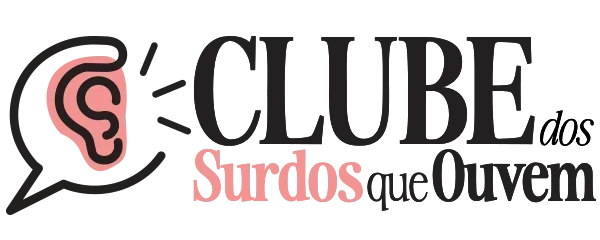The story of a deaf doctor
First, we had the illustrious story of the deaf medical student here on Crônicas. Now we have the life story of a deaf doctor. Both are a great example of overcoming for us. Get inspired! 🙂
The story of a deaf doctor
On the recommendation of my speech therapist, I decided to tell a little of my story, focusing on a particular subject that hasn’t yet been discussed in the experiences shared on this blog. I have severe, profound bilateral non-progressive sensorineural congenital deafness, which means I had nothing left to hear, so I had nothing left to lose.
I was diagnosed when I was three years old, after my parents had a crisis because I didn’t speak or interact like a normal baby. I was diagnosed with autism by a doctor, but thanks to my mother’s perseverance and skepticism about the diagnosis, we managed to find a doctor in São Paulo who finally got my real deafness problem right.
From then on, I began to receive speech therapy. As if that weren’t enough, something of an imposition of fate from an early age and almost cowardly for a baby, my first speech therapist was against the use of hearing aids and followed the theory of maximum individual adaptation to a disability. Initially, I had to learn to speak without the use of hearing aids. The most interesting thing is that it only worked when I was literate. After mastering reading and writing at a young age, I learned to speak. Wrong, of course, but they were the first steps on a 15-year journey.
In other words, I didn’t really learn to speak properly, in a way that would be understood by everyone, until I was 18.
The first devices
My mother thought it was crazy and, with the agreement and guidance of an ENT specialist, I had my first hearing aids fitted at the age of five. The big, analog, clunky kind. But I adapted well and I was very happy. I started to want to get along with people more. I even got a girlfriend. With this news, the speech therapist clashed with my mother and cut ties.
Those first events in my life influenced everything else, bringing advantages and disadvantages. One advantage has been that I’m more independent with what technology offers us, meaning I can live and have a certain social life without the use of gadgets. Another advantage was that, with literacy at the age of 3, I always devoured books and read very quickly, as there was no oral phase of reading. I became self-taught and only studied what interested me most: science and mathematics. Many disadvantages came along with it, such as the modern term bullying and stereotyping in school life.
Adapting to social life
I realized that our learning and social life in the process of adaptation takes a long time, and in this, we spend an entire childhood and adolescence, a period of crucial importance in the creation of bonds and cultural identification – especially acceptance by others. That was never granted to me. So I’d say I’ve created a personality of my own, naturally more introverted and aloof, which I’d call the deaf person’s personality, something culturally unique, singular.
Later, in adulthood, as I matured and adapted completely, I was able to accept and integrate fully into hearing society. In this, I’m trying to recover what I’ve lost. This is perhaps the deaf person’s biggest problem. He’s someone without a homeland; he’s not part of mainstream society because he doesn’t hear like others and he’s not part of the signaled deaf, who are a strong, united and well-adapted group, because they’ve never met them.
The training of a deaf doctor
Anyway, on my journey I became a doctor. I studied medicine in São Paulo, at USP, and specialized in an area that didn’t require hearing. There are specialties in which the greatest aptitude is intellectual and visual, such as pathology and radiology. I chose to do a residency in pathology. As I was always persevering and ambitious, I chose to get the best grades at school. And I managed to get into one of the best universities in the country, as well as doing a medical residency at the same institution. And I had to face the challenge of the foreign language…
Deafness, foreign languages and life abroad…
I took the initiative to learn English with great difficulty. It took four years of a lot of theory before I could even think about saying anything. To this day I walk on cobblestones, despite my fluency in writing and reading. So far, so good, I solve everything operationally. The problem began when the need arose to travel abroad frequently for congresses, symposia and courses. I even finished my residency in the USA. I realized that everything I had been through during my childhood and adolescence came back to me. Social incompetence, isolation and loneliness. This was because I found it extremely difficult to be understood and I made a huge effort to communicate: most people just walked away, or it all came down to simple protocols. In addition, he avoided everyone so as not to risk frustration and embarrassment. Professionally, as a deaf doctor, I have no complaints, because everything is more operational.
I always wonder if what I’m going through is common to all of us, if others have similar experiences. Most importantly, I’d like to ask everyone in this space: how do you deal with a foreign language in a foreign country in tourism, professional and social situations?
PS: Paula, as I write on a computer in Austria, configured for English, don’t mind the lack of accents.
Cheers,
R.”
BECOME A MEMBER OF THE DEAF WHO HEAR GROUP, CLICK HERE.
READ MORE ABOUT HEARING AIDS
- NYTimes: Why are hearing aids so expensive?
- How to get a free hearing aid from SUS
- How much does a hearing aid cost?
- American Academy of Audiology: audiologist’s guide to ISADs, amplifiers and PSAPs
- Hearing aid prices in 2021
OUR SOCIAL NETWORKS
- Facebook group (23,000 people)
- Telegram group with chat
- Youtube
RECEIVE OUR NEWS BY EMAIL
See this photo on Instagram

